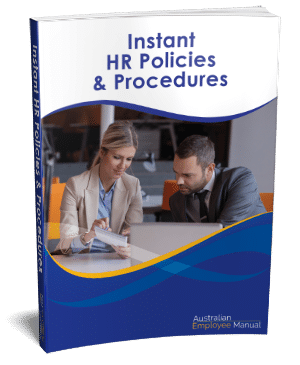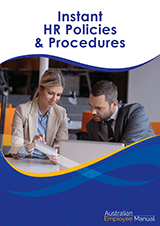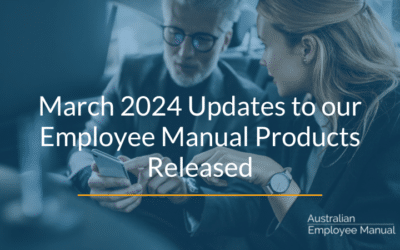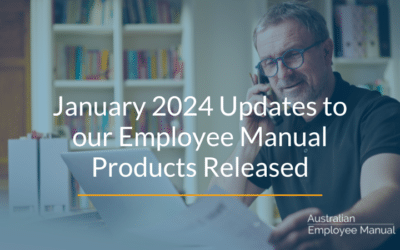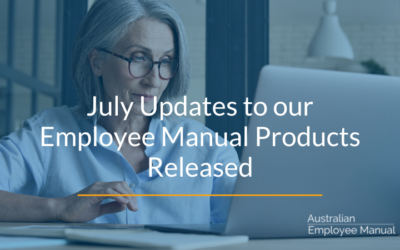For Australian small businesses, compliance with employment legislation begins from the very first hire.
However, navigating the complexities of these regulations can be time-consuming and overwhelming. That’s where clear operating procedures or employee policies can help.
By documenting policies and procedures, small businesses can achieve several benefits, including:
- Guide decisions and actions.
- Get consistency of approach.
- Clarify expectations.
- Save time.
An Employee Manual provides an easy-to-understand framework for adhering to employment legislation and answers the fundamental question of “How do we do things around here?”
While a comprehensive Employee Manual covers a range of issues, starting with the minimum essential policies can be a good initial step for businesses.
The 12 essential employee policies for small businesses in Australia
- Code of Conduct
- Workplace Harassment, Bullying and Discrimination Policy
- Workplace Health and Safety Policy
- Leave Policy
- Alcohol and Drugs Policy
- Performance Management
- Discipline and Termination of Employment Policy
- Information Technology Policy
- Internet and Social Media Policy
- Workplace Flexibility Policy
- Grievance Policy
- Privacy Policy
1. Code of Conduct
A Code of Conduct is a vital employment policy for any business in Australia. It clearly defines the expected and acceptable behaviours in the workplace and outlines the consequences if these expectations are not met.
If an employee breaches the Code of Conduct, it is the most common reason for disciplinary action or dismissal. Without a well-defined Code of Conduct, you are putting your business at risk of facing unfair dismissal claims. Therefore, having a clear and comprehensive Code of Conduct is crucial to avoid such risks.
2. Workplace Harassment, Bullying and Discrimination Policy
As an employer, you hold personally liability for any instances of harassment, discrimination, bullying or racial vilification that occur in your workplace.
You are also obliged to regularly train your employees on what constitutes harassment, bullying, discrimination, and racial vilification, and how to report and manage any behaviours that may occur.
To mitigate these risks, you must be able to demonstrate that you have taken all reasonable steps to prevent harassment, bullying, vilification, or discrimination.
This begins with establishing comprehensive policies and procedures. Given the complexity of the issues, many businesses prefer to separate this into several policies: Workplace Bullying, Sexual Harassment, Racial Vilification, and Anti-Discrimination.
By prioritizing these policies, you can create a safe and inclusive workplace environment for all employees.
3. Workplace Health and Safety Policy
As an employer, you are legally required to provide a safe workplace and system of work for your employees and visitors to your workplace.
A Workplace Health and Safety Policy is crucial for every business, as it clearly outlines the necessary procedures and responsibilities required to maintain a safe working environment.
While this Policy should give a high-level overview, many businesses choose to expand this Policy with additional policies covering specific risks or issues in a workplace: Manual Handling, First Aid, Mental Health, Fire, Workplace Rehabilitation, Domestic and Family Violence, Workplace Violence, Environmental and Waste Management, Working Safely from Home, Building Security, Workplace Surveillance, Pandemics, Severe Weather and Natural Disasters, Smoking, Testing and Tagging etc.
4. Leave Policy
Fair Work legislation, the National Employment Standards, and industrial agreements provide every employee with a range of leave entitlements. However, it can be challenging for employees to navigate these entitlements without a comprehensive Leave Policy in place.
A Leave Policy outlines the different forms of leave available, as well as the circumstances in which they can be taken. This policy not only benefits employees by providing clarity on their entitlements but also helps employers manage leave requests and ensure compliance with legal requirements. Therefore, having a clear and comprehensive Leave Policy is crucial for promoting a positive and productive workplace culture.
5. Alcohol and Drugs Policy
Employees who are under the influence of drugs or alcohol pose significant safety and reputational risks to any business. To mitigate these risks and ensure workplace health and safety, it is crucial to have policies in place to manage employees who come to work while under the influence of legal or illicit drugs.
An Alcohol and Drugs Policy is an essential tool for outlining acceptable behaviour and the consequences that employees may face if they breach the policy.
By implementing a clear and comprehensive policy, you can protect your business’s reputation, promote a safe working environment, and provide support to employees who may be struggling with substance abuse issues.
6. Performance Management Policy
While most employees aim to perform well in their job, there may be times when some employees fail to meet the required performance standards.
To ensure that your business complies with procedural fairness requirements, it is essential to have a clear policy that outlines acceptable standards of performance and the process to be followed if these standards are not met.
By establishing a well-defined Performance Management Policy, you can provide employees with clear expectations, establish a fair and consistent process for managing performance issues, and mitigate the risks associated with poor performance, such as decreased productivity and decreased employee morale.
With a comprehensive performance management policy in place, employers can proactively manage employee performance and promote a positive workplace culture
7. Discipline and Termination of Employment Policy
It’s a reality that every employee will eventually leave their current job, whether they resign, retire, or are dismissed.
However, employers must be mindful of the risk of unfair dismissal claims before Fair Work Australia.that may arise if you unfairly discipline or dismiss an employee.
To mitigate this risk, it’s crucial to have clear guidelines in place regarding the discipline and termination process. A well-defined policy can help ensure that employees are treated fairly and that employers are compliant with legal requirements.
By establishing a comprehensive policy, employers can protect their business from potential legal action and promote a positive workplace culture that prioritizes procedural fairness.
8. Information Technology Policy
In today’s business landscape, Information Technology (IT) is essential for any organization.
However, if IT hardware such as computers, phones, and photocopiers, or software programs and apps are misused, it can pose a significant risk to the company. This can include potential shutdowns due to ransomware, malware, or unauthorized access to sensitive client or business information.
To mitigate these risks, it’s crucial to have an IT Policy that outlines acceptable and unacceptable use of your IT systems and equipment. This helps to ensure that everyone within the organisation understands their responsibilities and obligations, and reduces the overall risk to the business.
9. Internet and Social Media Policy
Although employees are entitled to their private lives outside of work, it’s important to consider the potential harm that could be caused by their actions or comments on the internet or social media.
For example, an employee may unintentionally share confidential client or business information, engage in harassment or bullying, or express views that are contrary to the values of the company.
To mitigate these risks, implementing an internet and social media policy is critical. Such a policy can help employees navigate the boundaries of what is acceptable and not acceptable to disclose, and provide guidance on how to manage the personal, professional, and business aspects of their online presence.
This not only protects the business but also empowers employees to use social media and the internet in a responsible and respectful manner.
10. Workplace Flexibility Policy
Many employees are legally entitled to explore workplace flexibility options to assist them in managing caring or other responsibilities.
To assist employees and provide guidance on available options, application procedures, and effective management of workplace flexibility, it’s essential to have a Workplace Flexibility Policy in place.
This policy not only supports employees but also demonstrates the business’s commitment to work-life balance and can lead to improved employee satisfaction, retention, and productivity.
11. Grievance Policy
Conflicts are inevitable in any workplace, and it’s not uncommon for employees to disagree with each other or with management decisions. In such situations, having a grievance policy can help to effectively address the issue and find a positive resolution.
A grievance policy outlines the steps that employees can take to raise and resolve concerns, providing a clear and transparent process for addressing conflicts.
By establishing a framework for dealing with grievances, the policy helps to minimize the impact of conflicts on the workplace, reduce stress for employees, and promote a culture of open communication and respect
12. Privacy Policy
The privacy of employee and client information is protected by Privacy Legislation, and it’s important for businesses to comply with these laws.
To achieve this, having a Privacy Policy is crucial. A Privacy Policy outlines the types of information that need to be kept confidential, the measures in place to ensure that this information remains private, and the actions that will be taken if private information is leaked.
By clearly communicating these guidelines to employees, clients, and other stakeholders, a Privacy Policy helps to establish trust, protect sensitive information, and maintain compliance with relevant legislation.
Other HR Policies
While the twelve policies discussed above are essential for every small business in Australia, there may be additional policies required based on the specific needs of your business. Examples of additional policies could include Recruitment and Selection, Driving and Motor Vehicles, Anti-Bribery and Corruption, Uniforms, Learning and Development, Intellectual Property, Outside Employment, Criminal History, Whistleblowing, and more.
Ultimately, the purpose of employee policies is to support your business by clarifying expectations and processes for your employees. By implementing policies that align with your business needs and values, you can foster a positive and productive work environment that benefits both employees and the business.
How we can help
Since 2007, the Australian Employee Manual team has been delivering clear and comprehensive employee policy templates tailored to the unique needs of micro and small businesses in Australia.
Our policies are designed to be user-friendly, with straightforward language and editable Word format. To ensure compliance with current legislative guidelines, our policies are regularly reviewed and updated.
With our expertise, you can easily manage your employees without the hassle of creating policies from scratch. We provide the policies you need to maintain a positive and productive workplace, while staying up-to-date with the latest regulations.
